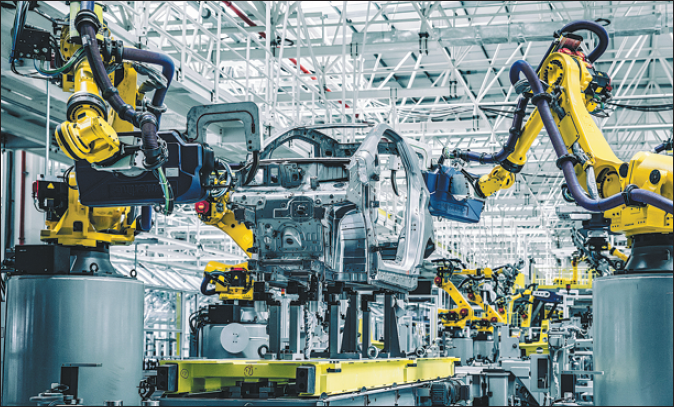
The Guangzhou Science City in the Guangzhou Development District, Guangdong province, is home to numerous high-tech companies. [Photo by LI JIANFENG/FOR CHINA DAILY]
Small and medium-sized enterprises at the Guangzhou Development District, Guangdong province, are playing a bigger role in innovation and expanding their footprint in the global technology arena thanks to the district's constant efforts to improve its business environment.
Official data showed that in 2019, the number of private businesses and SMEs in the district each with annual revenue of more than 20 million yuan ($2.97 million) increased 39.2 percent year-on-year. They helped contribute 64.5 percent of the total business revenue and 93.4 percent of the district's total sales volume.
The district saw 61 private businesses or SMEs become publically listed in the year, up 45 percent from 2018. Many private businesses and SMEs have developed leading technologies that have helped break overseas technological monopolies, according to the district.
Among them, Guangzhou Hexin Instrument, a monitoring equipment manufacturer in the district, has focused its business on developing mass spectrometers-devices that measure the mass-to-charge ratio of ions.
In the first nine months of 2020, Hexin saw its year-on-year output value increase of 90.42 percent, according to the company.
Hexin is implementing an industrial base project worth total investment of 150 million yuan, which is planned to be put into operation in 2021.
The company said it is also developing other mass spectrometers in line with the huge domestic demand in fields such as environmental monitoring and is expected to bring them to market in the next two to three years.
Over the past two years, the district had rolled out a series of policies to provide preferential treatment for SMEs to accelerate their development in innovation and expand their businesses. These include granting financial support, establishing industrial funds and helping cultivate talents.
Guangzhou Mino Automotive Equipment, a high-tech company focused on providing intelligent solutions for the automotive and general manufacturing industry, is an SME in the district.
Under the ever-changing global pattern, innovation provides a strong impetus for supporting SME development and intelligent manufacturing transformation, said Yao Weibing, chairman of Mino.
The company said it began setting up branches in the United States and Germany in 2014, with its overseas projects accounting for 60 percent of its business in 2018.
Mino has formed a business cluster combining intelligent manufacturing solutions, industrial internet data technology services and industrial finance, Yao said.
The company has become a global supplier of auto giants such as BMW, Mercedez-Benz and Toyota.
Focus on promoting high-quality development of technology-based SMEs, the district is striving to cultivate role models in the new generation of information technology, new materials, new energy and biomedicine sectors.

An automated production line assembles a vehicle at Guangzhou Mino Automotive Equipment. [Photo provided to China Daily]
Another successful business in the district is Guangzhou CanSemi Technology, a chip manufacturer established in 2017.
In 2019, the company put its 12-inch chip production line into operation in Guangzhou-the first of its kind in South China's Guangdong province.
In the second quarter of 2020, CanSemi said it achieved a record 105 percent month-on-month increase in shipments and a 78.8 percent increase in monthly average wafer trade.
"In 2020, we hope that our chips for civilian and automotive purposes can address market needs in the Guangdong-Hong Kong-Macao Greater Bay Area," said Chen Wei, president of CanSemi.
The company will spare no effort in developing biosafety and health chip products for sectors including biological detection, video surveillance cameras and infrared temperature measurement control, Chen said.
To date, the district is home to more than 20,000 private businesses and SMEs. More than 80 percent of the high-tech companies in the district are private SMEs, official data showed.
The burgeoning development of private businesses has become a major engine driving the socioeconomic development of the district, local officials said.
To ignite the vitality and creativity of high-tech private SMEs, the district has issued a pilot plan, according to Zeng Fanrong, director of the reform coordination division of the policy research office at the Guangzhou Development District.
By 2023, the district is expected to be home to some 3,500 technology-based companies. By 2025, the number will reach 5,000, with an average annual growth rate estimated at over 12 percent, according to the plan.
At present, the district has built the largest incubator cluster for technological companies in South China, making it a key destination for emerging industries and high-tech innovative companies.
So far, the district is home to 105 incubators for technology-based businesses, with 14 of them national-level. It has 51 service platforms for innovators, with 11 of them at national level, and seven business accelerators for technological companies.
"We are aiming to develop qualified technology-based private SMEs with leading economic and innovation power in the country, and producing a group of pioneering SME brands," Zeng said.
"We want to build the district as a benchmark area for technology-based private SMEs in Guangdong province or even across the country."

